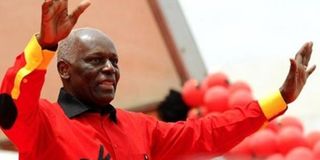Angola's veteran President Dos Santos names defence minister as his successor

The 74-year-old veteran Angolan President Jose Eduardo dos Santos announced Friday he will not run in August elections. AGENCIES PHOTO
What you need to know:
- Peace came only after 2002, and the country is still deeply scarred by a conflict that was a vicious proxy battleground in the Cold War rivalry of the United States and the Soviet Union.
- After fighting ceased, a frenetic oil boom saw skyscrapers sprout up in the centre of the capital Luanda and paid for nationwide infrastructure improvements.
Veteran Angolan President Jose Eduardo dos Santos announced Friday he will not run in August elections, ending 37 years in power and naming his defence minister as candidate to succeed him.
The autocratic 74-year-old has been the oil-rich country's president since September 1979, making him Africa's second-longest serving leader -- one month short of Equatorial Guinea's Teodoro Obiang Nguema.
His rule has seen the end of civil war and an investment boom, but has also been criticised as secretive and corrupt, with Angola's citizens suffering dire poverty as his family became hugely wealthy.
Dos Santos told a meeting of the ruling MPLA party in Luanda that "the party approved the name of the candidate heading the list in the August elections as (Defence Minister) Joao Manuel Goncalves Lourenco".
Lourenco, a former general, emerged as the probable next president late last year at another meeting of the MPLA (People's Movement for the Liberation of Angola).
Earlier in the year, Dos Santos had said he would step down in 2018.
The party -- which faces no real political opposition -- recently issued a statement denying reports that Dos Santos was seriously ill.
After constitutional changes in 2010, Angola does not directly elect a president, but the leader of the winning party automatically becomes head of state.
Change awaits?
Despite Lourenco being a party loyalist, the end of Dos Santos's regime could open a new chapter for a country largely closed off to the outside world.
The president has been a dominating presence in daily life longer than most Angolans can remember, exercising personal authority over government, politics, media and business.
When Dos Santos became president in 1979 -- following the sudden death from cancer of Angola's liberation president Agostinho Neto -- civil war was already raging between the MPLA government and UNITA rebels, four years after independence from Portugal.
Peace came only after 2002, and the country is still deeply scarred by a conflict that was a vicious proxy battleground in the Cold War rivalry of the United States and the Soviet Union.
After fighting ceased, a frenetic oil boom saw skyscrapers sprout up in the centre of the capital Luanda and paid for nationwide infrastructure improvements.
But it left millions of ordinary Angolans living in slums, and the collapse in oil prices has triggered a full-scale national economic crisis since 2013.
"In some ways he is the father figure of the nation, widely seen -- rightly or wrongly -- as the man who ended the war," Soren Kirk Jensen, an Angola specialist at the London-based Chatham House think tank, said recently.



